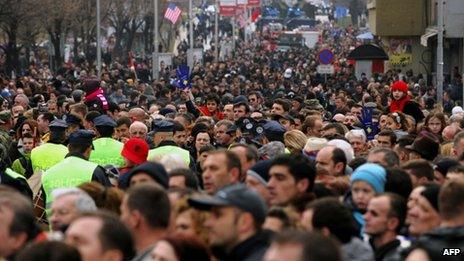Kosovo marks fifth year of independence from Serbia
- Published

The Republic of Kosovo was having a birthday - and it wanted everyone to know.
Posters proclaiming "KO5AVA" were plastered across the capital, Pristina, to coincide with the fifth anniversary of the unilateral declaration of independence.
At the "Newborn" monument, volunteers got busy with paintbrushes. They adorned each letter of the sculpture with the flags of the 98 countries which have so far recognised Kosovo.
Notably missing were the red-white-and-blue banners of Serbia and Russia. They are among more than 90 UN member states which have refused to acknowledge independence. Indeed, as far as Serbia is concerned, Kosovo is still its southern-most province.
Shelf labelled 'crisis'
Such matters are brushed aside by Petrit Selimi. Kosovo's deputy foreign minister wants to highlight the progress the country has made - noting its low national debt and steady economic growth.
But he does acknowledge that his country's status can be problematic.
"For me maybe the failure is for our kids and our youth; we don't have a team in the Champions League, we don't have a song in Eurovision song contest. Sometimes the platforms of national identity are more important to make us proud," he said.
Other things are missing too.
Kosovo still does not have an international telephone dialling code - and, unlike other Balkan countries, its citizens cannot travel visa-free to the European Union.
And the international presence here is still significant.
"Supervised independence" may have come to an end last year, but KFOR international peacekeepers remain a common sight in Kosovo. Meanwhile the EU's rule-of-law mission, EULEX, is crucial while Kosovo's own judiciary is in its infancy.
Some view the international missions as less than helpful.
"They've put us on a shelf that's labelled 'crisis'," says opposition leader, Albin Kurti.
"They keep comparing us with Afghanistan, Palestine and Bosnia. They're not saying we got out from war and should prosper - but they got out and how do we stop it happening again."
Others suggest the considerable influence of western diplomats is stifling the growth of democracy in Kosovo.
"They prefer having in power politicians they control rather than those that have capacity to improve society," says Ardian Arifaj, senior researcher at the Kosovar Institute for Policy Research and Development.
Serb compromise?
In Northern Kosovo, the problem is control of any kind. Most of the population there is ethnic-Serb, and they have rejected government from Pristina. As far as they are concerned, they are still citizens of Serbia.
Most of them live in the northern half of the town of Mitrovica, split down the middle by the River Ibar.
On one side of the bridge, which is blocked to traffic, Serbian flags flutter. On the other, the blue-and-yellow colours of the Republic of Kosovo fly alongside the black-and-red Albanian flag.
Most Serbs are quick to voice their fear: the ethnic-Albanians want their land, but not the people currently living there.
"We are scared for our kids and property - deeply scared," says Kosovo Serb leader, Oliver Ivanovic.
"We have no electricity or water on a daily basis. But we are still happy - because people are afraid it could be worse. They are afraid of the possible political changes which could make us even more concerned for our lives."
Developments may come sooner than the Kosovo Serbs would like.
Serbia wants to become a member of the EU - and that means it will have to compromise on Kosovo. The prime ministers of the two countries have been holding regular meetings in recent months.
The Serbs in the North fear that Belgrade will sacrifice them - meeting a similar fate to Croatia's Serbs almost 20 years ago.
But Albanians in the South worry about the creation of an autonomous area. That might - as they see it - make Kosovo into another mess like ethnically-divided Bosnia.
So while Pristina enjoyed its party weekend, the clear-up will have to cover the big issues - for both the north and south of Kosovo.
- Published17 February 2013
- Published22 October 2012
- Published19 October 2012
- Published10 September 2012
- Published25 November 2022